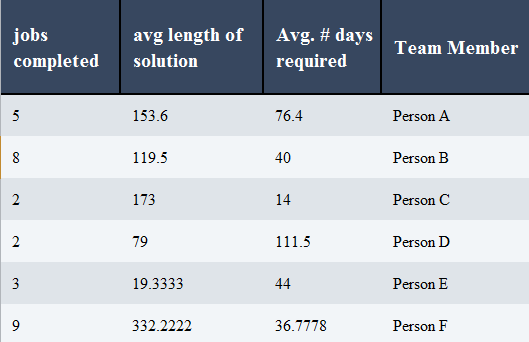I coordinate a small team that is responsible for (among other things) a software-based IT helpdesk solution. I'm looking to introduce a fun rolling award for the "helpdesk champion" of the past 30 days that in some way is linked to each person's performance in completing jobs via the helpdesk (as an incentive to engage with it etc.)
The helpdesk software allows me to get data on the following for each person:
- Number of jobs completed
- Average number of days required to complete jobs
- Average length of solution
I figure this allows me to potentially figure out some measure of quantity, timeliness and thoroughness of their work. Any suggestions about how I might be able to work this into an algorithm/weight this data somehow?
Here is a set of sample data from my system:

